
Introduction:
Do your donor connections have a lot of data but little insight?
What if your CRM could automate impact reports, forecast donor behaviour, and customize each supporter’s path?
What if it could accomplish all of that without going over budget?
Welcome to the new era of digital transformation for nonprofits, where AI isn’t limited to Big Tech and multibillion-dollar organizations. Today, social entrepreneurs, humanitarian projects, and grassroots organizations may use it to strategically and intelligently expand their mission-driven activity.
- What makes a CRM useful in today’s charities
- The particular difficulties nonprofits encounter while managing donors and data
- The best AI-powered CRMs designed with charity in mind
- Case studies and real-world examples of how businesses just like yours are using these technologies to achieve success
- How Nusaker used AI to create a donor-centered, data-driven impact model
Let’s begin by comprehending the basic distinction AI makes for charitable organizations such as Nusaker, and how selecting the appropriate CRM may be crucial for long-term donor loyalty and sustainable growth.
The Need for a Specialized Best CRM for Charities Empowering Nusaker
The Charity Challenge: Limited Resources, Complex Needs
Tight funds, strict standards for openness, and the emotional burden of transforming lives are some of the particular constraints charities face. However, a lot of people are still trapped in antiquated databases or spreadsheets that provide no automation or insight.
- Among the main pain locations are:
- Donor attrition and irregular involvement
- Data input and reporting by hand
- Platforms for communication that are disconnected
- Unable to scale campaign personalization
- Absence of useful data insights
What Qualifies as “Charity-Friendly” in a CRM?
- A charity CRM has to be more than just a contact management system. It ought to:
- Encourage a variety of fundraising strategies (online, offline, events)
- Keep track of contributions and automatically create receipts.
- Make donor journeys that are unique to each donor.
- Create impact reports using as little manual labor as possible.
- Connect with platforms for fundraising, accounting, and marketing.
- Provide segmentation, automation, and strong analytics.
The Story of Nusaker: Establishing an Ingenious Charity from the Ground Up
From Regional Origins to Worldwide Perspective
Nusaker started off with the straightforward yet impactful goal of empowering marginalized adolescents in Sub-Saharan Africa via education and internet literacy. The nonprofit, which was founded in 2018 by a group of recent graduates, began humbly, working out of a single donated office space in Nairobi and mostly using spreadsheets and manual outreach to connect with contributors and monitor results.
Through volunteer-driven initiatives and grassroots financing, Nusaker gained traction in the first two years. But complication accompanied expansion. By 2020, the company was balancing:
- Hundreds of disparate Excel pages with donor details
- Each campaign’s email correspondence is done by hand.
- Restricted ability to observe trends in donation or donor behaviour
- Lack of a single location to oversee partners, volunteers, and event participants
“We were operating in the dark, but we knew we needed to scale,” stated Jane Muthoni, Director of Programs at Nusaker. “It felt like we were starting from scratch every time we conducted a fundraising campaign.”
The Problem: Unstructured Growth
Nusaker, like many tiny charities, has a number of problems:
- Data Silos: Information about events, volunteers, and donors was stored in different systems.
- Low Donor Retention: About 36% of donors were retained each year.
- Manual Procedures: Reports for stakeholders were created over the course of many weeks.
- Absence of Personalization: Regardless of their past contributions or giving patterns, all contributors got identical emails.
- Zero Predictive Analytics: The group was unable to predict which contributors would either increase or decrease their contributions.
In addition to being ineffective, the absence of an integrated CRM was delaying the impact of their purpose.
Introducing Salesforce Nonprofit Cloud + AI
Nusaker was chosen for the Salesforce.org Power of Us Program in 2021, which offers ten complimentary CRM subscriptions to qualified charitable organizations. This marked a sea change.
The Nusaker team implemented the Salesforce Nonprofit Success Pack (NPSP) and integrated AI technologies using Salesforce Einstein in collaboration with a volunteer Salesforce implementation partner. Their objectives were lofty:
- Consolidate program and donor data.
- Automate tax receipts and thank-you notes
- Determine which contributors were most likely to churn using AI.
- Adapt outreach to the interests and behavior of donors.
- Make program impact dashboards in real time.
Jane stated, “We wanted more than just a CRM.” “We were looking for a knowledgeable partner who could assist us work more efficiently and effectively.”
What Was Different: The Effect of an Intelligent CRM
After a full year of CRM use, the transformation was astounding.
A 24% increase in donor retention
Nusaker created customized email marketing after segmenting at-risk contributors using Einstein’s predictive analytics. These re-engagement emails greatly decreased donor turnover and had an open rate of 46%, which is almost double the industry average.
Tailored Communication become the norm.
- The team began customizing messages according to donor history using AI-driven insights:
- Personalized onboarding sequences were sent to new donors.
- Behind-the-scenes impact stories were sent to monthly donors.
- Program updates and customized video thank-yous were sent to major contributors.
By personalizing emails, click-through rates increased by 38%.
Every week, automation saved over twenty staff hours.
- Workflows were automated to deliver event reminders and receipts rather than by hand:
- After donations, welcome emails are sent.
- Birthday greetings for regular donors
- Automated reminders for volunteers and contributors who have stopped contributing
The small team was able to concentrate more on developing relationships and delivering the program as a result.
Instantaneous Reporting for Funders and Donors
- Salesforce dashboards were used by Nusaker to generate real-time views of:
- The amount of money raised for each campaign
- Program reaches by geographic area
- Monthly rise in donors
The funders were impressed. One significant foundation renewed its funding for an extra two years, citing data-driven reporting and openness as critical factors.
The CRM lead for the team stated, “We went from data chaos to data clarity.” “We can now use statistics to demonstrate our impact.”
AI-Powered Education: What Nusaker Did Correctly
For other nonprofits wishing to use AI-powered CRMs, Nusaker’s tale provides many important lessons:
| What They Did Right | Why It Mattered |
| Started small, scaled up | They focused on essential automations first, avoiding burnout. |
| Leveraged free nonprofit programs | Used Salesforce’s free licenses and volunteer consultants. |
| Prioritized training | Staff took free Trailhead courses to build CRM literacy. |
| Tied CRM usage to mission impact | Framed tech adoption as a path to serve more youth. |
| Focused on insights, not just storage | AI was used for prediction, not just record-keeping. |
Nusaker Today: A Donor-Favoured Nonprofit Driven by Data (Artificial Intelligence
Since implementing their smart CRM stack, Nusaker, which currently operates educational initiatives in three countries, has seen a 30% decrease in donor attrition and a 70% increase in recurring donations.
With the use of AI and CRM capabilities, they now intend to incorporate mobile-first donor experiences, chatbot interaction, and SMS giving.
Jane asserted, “Technology did not replace our humanity.” “It intensified it.”

The Best CRM for Charities Empowering Nusaker
With AI, automation, and data-driven insights, the correct solution may unlock amazing efficiency and effect for nonprofits like Nusaker, who are growing their operations and strengthening their connections with donors.
The Best CRM for Charities Empowering Nusaker options for charities in 2025 are examined in this chapter, along with their salient features, AI capabilities, cost, and applicability to various nonprofit organizations and missions.
Summary Table: The Best CRM for Charities Empowering Nusaker Comparisons
| CRM Name | Best For | AI Capabilities | Starting Price | Key Features / Strengths |
| Salesforce Nonprofit Cloud | Large, AI-driven organizations | Einstein AI, donor prediction, automated flows | Free (10 users) | Highly customizable, deep analytics, large ecosystem |
| Bloomerang | Mid-sized nonprofits focused on donor retention | Engagement scoring, smart segmentation | $125/month | Donor-centric, easy-to-use, great dashboards |
| Virtuous CRM | Responsive fundraising & mid-large orgs | Donor journey automation, behavior tracking | $300/month | Automated donor journeys, responsive fundraising tools |
| HubSpot for Nonprofits | Marketing-focused nonprofits | Lead scoring, behavior tracking, marketing AI | Free (discounted plans) | CRM + marketing, content tools, email & social automation |
| Kindful | Small nonprofits and startups | Basic automation, donor alerts | $100/month | Simple UI, integrated donation tracking, receipt automation |
| Neon CRM | Memberships, events, mid-sized charities | Email automation, goal tracking | $99/month | Fundraising + events + volunteer management |
| DonorPerfect | Grant-heavy orgs, legacy nonprofits | Predictive analytics, smart alerts | $99/month | Grant management, donor segmentation, integrations |
| Keela | Data-driven nonprofits with lean teams | AI-based ask amounts, smart timing | $99/month | Fundraising + project management, clean UI |
| Little Green Light | Budget-conscious small nonprofits | Basic automations, donor alerts | $45/month | Easy to set up, great support, affordable |
| EveryAction / Bonterra | Advocacy and campaign-driven orgs | Multi-channel AI, supporter journey triggers | Custom | Integrated advocacy + fundraising + digital outreach |
| Monday.com (CRM Template) | Visual and collaborative nonprofit teams | Custom rule-based automations | Free (with discounts) | Workflow/project + CRM combo, flexible templates |
| CiviCRM | Tech-savvy nonprofits needing open-source CRM | Custom via plugins (no native AI) | Free (self-hosted) | Open-source, flexible, customizable via WordPress/Drupal |
| Fundly CRM | Online fundraising + donor management | Basic automation | $60/month | Crowdfunding + donor CRM |
| ChurchCRM | Churches & faith-based organizations | None | Free | Tithes, attendance, family tracking |
| Raklet | Membership NGOs, international reach | Smart segmentation | Free / $49+ | Membership CRM + mobile apps |
Here is a breakdown of the Best CRM for Charities Empowering Nusaker:
Salesforce Nonprofit Cloud
Is Ideal For: Big, expanding NGOs that require specialized workflows and strong AI integration
Overview:
The most robust and adaptable CRM for nonprofit organizations is still Salesforce Nonprofit Cloud. It is designed to manage grant management, volunteer coordination, fundraising, and program monitoring. It is built on the reliable Salesforce platform and augmented with the Nonprofit Success Pack (NPSP).
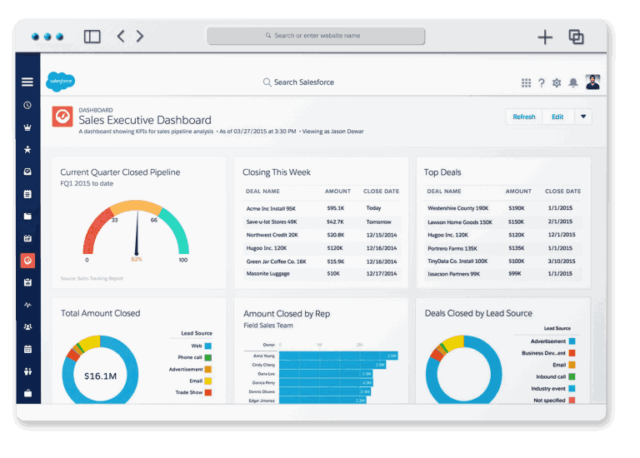
Highlights of AI and Automation:
- Salesforce Einstein: Segments audiences for tailored marketing, forecasts donations, and predicts donor behavior.
- Flow Automation: Automates workflows for re-engagement, receipts, and thank-you notes.
Real World Example:
Nusaker utilized Salesforce to:
- Boost donor retention by 24%.
- Use automated procedures to save more than 20 staff hours every week.
- Create impact dashboards for donors in real time.
Pros:
- Incredibly adaptable and scalable
- Deep AI capabilities
- Robust network of partners and applications
- Ten free licenses are available through the Power of Us Program.
Cons:
- A steeper learning curve
- Setup requires implementation support.
Pricing: Free for up to ten users; integrations and customizations incur extra fees.
Source: Visit Salesforce.org for Nonprofits to find out more.
Bloomerang
Is Ideal For: Mid-sized NGOs that prioritize retaining and engaging donors
Overview:
Bloomerang is renowned for its user-friendly interface and dedication to retaining donors. Nonprofits can better analyse and respond to donating behaviour thanks to its integrated donor engagement scoring.
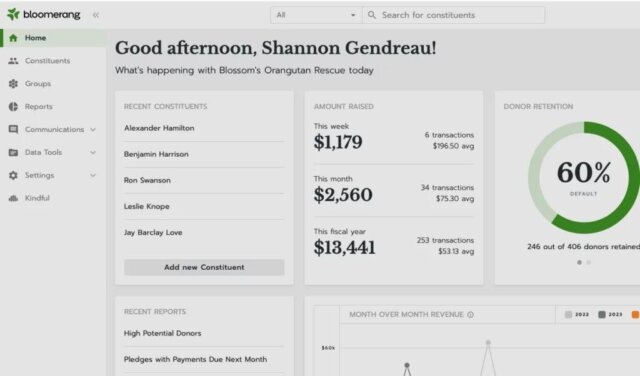
- t combine fundraising and marketing
Cons:Highlights of AI and Automation:
- Predictive grading for donor retention
- Customized tracking of the donor journey
- Workflows for automated thank-you notes
Real-World Example:
Over the course of a year, the Children’s Healing Fund raised their major contribution income by 31% by using Bloomerang to segment high-value contributors.
Pros:
- Donor-focused characteristics
- Outstanding dashboards for engagement and reporting
- Simple to set up and utilize
Cons:
- Less adaptable for intricate program administration
- Few methods for tracking grants
Pricing: Depending on the size of the donor database, it starts at about $125 per month.
Source: To find out more, visit www.bloomerang.co.
Virtuous CRM
Ideal For: Nonprofits that prioritize growth and employ responsive fundraising
Overview:
By providing automated and customized donor experiences, Virtuous aims to promote giving. Its dynamic interactions depending on donor behaviour are at the heart of its responsive fundraising methodology.
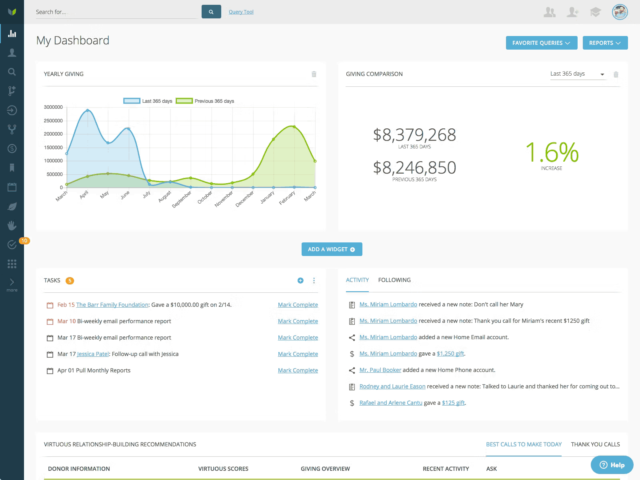
Highlights of AI and Automation:
- Automated touchpoints for donors
- Clever segmentation and advertising based on triggers
- Dashboards with responsive design to monitor gifting patterns
Real-World Example:
By automating outreach according to donor lifecycle stages, the HopeBridge Foundation noticed a 42% increase in email engagement.
Pros:
- Robust AI for modeling donor behavior
- Outstanding automation tools and donor pipelines
- Features tha
- For smaller organizations, prices may be higher.
- Some training is necessary to fully utilize
Cost: Approximately $300 per month (custom rates available)
Source: Visit www.virtuous.org to learn more.
Nonprofit HubSpot CRM
Ideal For: Engaging tiny charities and marketing-savvy NGOs
Overview:
HubSpot provides a robust CRM together with first-rate capabilities for social media, email automation, and content marketing. Its free tier is particularly helpful for new tiny nonprofit organizations.
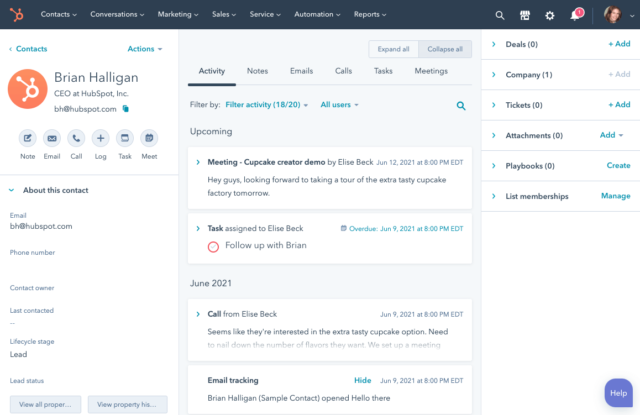
Highlights of AI and Automation:
- AI-powered predictive lead scoring (available in premium subscriptions)
- Social automation and email
- Monitoring of contact behaviour
Real-World Example:
By using HubSpot to improve email targeting and create SEO-focused blog content, GreenPlanet Africa increased their donor base by 52%.
Pros:
- With numerous features, it’s free to start.
- Excellent for managing campaigns and content
- Smooth connections for marketing
Cons:
- Not designed with fundraising in mind
- Lacks elements that are very specialized to nonprofits.
Cost: Nonprofit discounts on premium services; free basic CRM
Source: Visit www.hubspot.com/nonprofits to find out more.
Kindful (by Bloomerang)
Ideal For: Small NGOs looking for gift tracking and simplicity of usage
Overview:
Kindful is a simple, lightweight CRM made for smaller groups. Currently a component of Bloomerang, it provides online giving forms, easy monitoring of donations, and interaction with Classy and Mailchimp, two fundraising platforms.
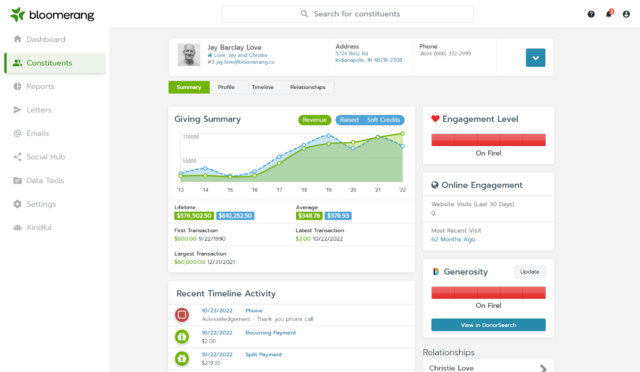
Highlights of AI and Automation:
- Alerts on donor activities
- Fundamental guidelines for communications automation
- Combining analytics tools
Real-World Example:
Without the help of technical personnel, Art4All, a grassroots arts nonprofit, utilizes Kindful to track volunteer hours, generate tax receipts, and handle 1,200+ donations.
Pros:
- Easy to understand and simple
- Excellent environment for integration
- Reasonably priced for small teams and startups
Cons:
- Inadequate prediction or AI capabilities
- Less adaptable for intricate tasks
Cost: Prices start at $100 per month.
Source: Visit www.kindful.com to learn more.
Neon CRM
Is Ideal For: Nonprofits seeking a single platform for events, membership, and fundraising
Overview:
Neon CRM is a powerful and adaptable platform that provides powerful capabilities for volunteer coordination, peer-to-peer fundraising, event ticketing, and contribution administration.
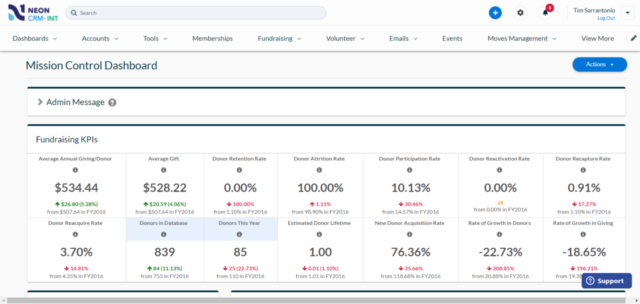
Highlights of AI and Automation:
- Workflows for email automation
- Integrated A/B testing in emails
- Goal tracking and intelligent dashboards
Real-World Example:
In only six months, Neon CRM helped the community garden project UrbanGrow quadruple event attendance and boost donor reactivation by 28%.
Pros:
- Platform with lots of features
- Excellent tools for events and memberships
- Economical for medium-sized organizations
Cons:
- Might first feel overpowering.
- UI design is a little out of date in comparison to more recent platforms.
Cost: Prices start at $99 per month.
Source: Visit www.neonone.com to learn more.
DonorPerfect
Is Ideal For: Grant management and fundraising-focused mid- to big charitable organizations
Overview:
More than 50,000 charitable organizations worldwide rely on DonorPerfect, one of the most well-known donor management systems available. Organizations that want robust reporting, donor differentiation, and campaign management features in an intuitive interface may find it appealing as it excels in fundraising operations.
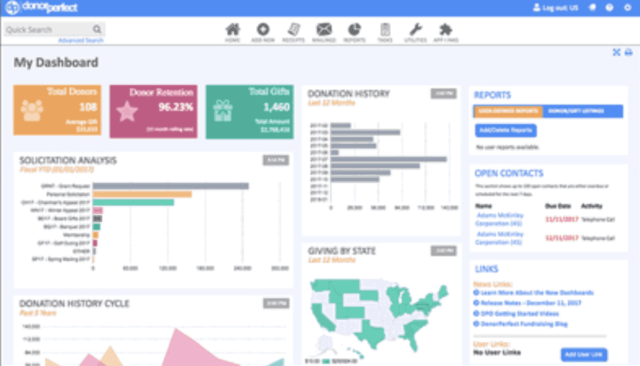
Highlights of AI and Automation:
- Tools for predicting donor scores
- Dashboards for intelligent analytics
- Automated reminders and thank-yous for donations
Real-World Example:
By automating their reporting routines and categorizing all of their donation history, Hope2Read, a literacy organization in Florida, was able to raise grant revenue by 45% in only one year using DonorPerfect.
Pros:
- Adaptable to intricate fundraising initiatives
- Integrated grant monitoring
- Outstanding client service
Cons:
- Not as contemporary an interface as more recent tools
- There must be a learning phase for setup.
Cost: Starting at $99 per month, the price is adjusted according on the size of the database.
Source: Visit https://www.donorperfect.com/ to learn more.
Keela
Is Ideal For: Data-driven small to medium-sized NGOs seeking integrated project management and artificial intelligence
Overview:
Keela is a CRM developed in Canada that was created especially for small charity organizations. It integrates messaging, AI-powered fundraising analytics, integrated reporting, and donor management.
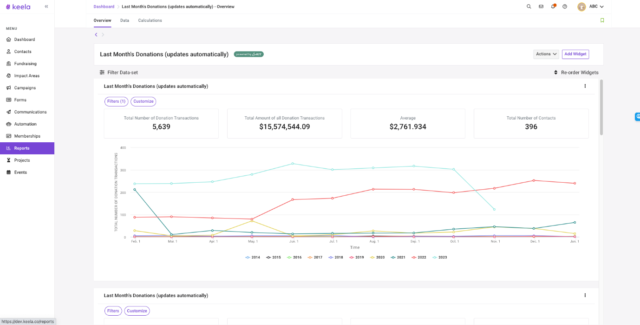
Highlights of AI and Automation:
- Intelligent ask amount generator
- Suggestions for the best time to donate
- Tools for project management and email marketing
Real-World Example:
By utilizing Keela’s AI-powered donor segmentation and timing capabilities, Books for Change was able to raise their email open rates by 60%.
Pros:
- Integrated technologies that take the role of Google Forms, Asana, and Mailchimp
- Donor scoring powered by AI
- Extremely intuitive user interface
Cons:
- Its integration ecosystem is still expanding.
- Limited assistance for third-party automation
Cost: Prices start at $99 per month.
Source: Visit https://www.keela.co/ to learn more.
The Little Green Light
Ideal For: Small groups seeking easy-to-use, reasonably priced donation management
Overview:
Little Green Light (LGL) is renowned for its affordability, robust features, and ease of use. It’s excellent for managing pledges, monitoring volunteers and donors, and creating forms.
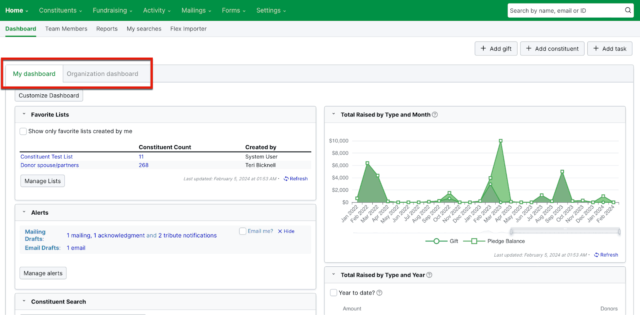
Highlights of AI and Automation:
- Alerts and intelligent reporting
- Reminder emails that are scheduled
- Zapier integration for more automation
Real-World Example:
Using LGL’s forms and pledge management tools, Southwest Arts Collective earned $90,000 in a single season while managing over 850 contributors.
Pros:
- Economical
- Simple for novices
- Great training and support documents
Cons:
- Absence of integrated AI
- Limited mobile support and simple analytics
Cost: $45 per month for a maximum of 2,500 contacts
Source: Visit https://www.littlegreenlight.com/ to learn more.
EveryAction (which is currently a part of Bonterra)
Ideal For: Political groups and NGOs with an advocacy focus
Overview:
Now operating under the Bonterra name, EveryAction is a potent CRM that combines digital marketing, multi-channel interaction, grassroots advocacy, and donation management.

Highlights of AI and Automation:
- Journeys of action-triggered supporters
- Analytics that predict donating behaviour
- Integration of calls, emails, and texts
Real-World Example:
Using integrated SMS and email capabilities, Democracy Youth Now launched a nationwide voter education campaign using EveryAction that reached 2 million people in only six weeks.
Pros:
- Integrated advocacy tools
- Excellent for action alerts, policies, and campaigns
- Large databases are supported.
Cons:
- Advocacy is more appropriate than typical charity.
- Too costly for little nonprofit organizations
Pricing: Personalized prices according to contact volume and characteristics
Source: Visit https://www.bonterratech.com/ to learn more.
Monday.com (CRM template) for the Nonprofits
Ideal For: Nonprofits in need of a visible, adaptable CRM with project monitoring
Overview:
Monday.com provides configurable CRM templates and is perfect for charities who require workflow/project collaboration in addition to donation tracking, even though it is not a specific nonprofit CRM.
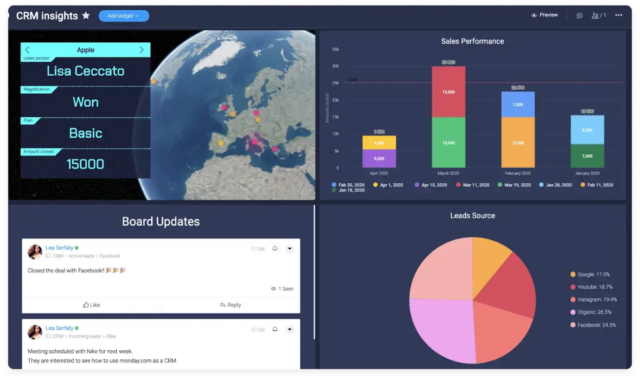
Highlights of AI and Automation:
- Intelligent automations for donor touchpoints and job reminders
- AI connections through webhooks and applications
- Grant and campaign timeline visualizations
Real-World Example:
Monday.com’s nonprofit dashboard template is used by Clean Rivers Initiative to manage its grant timeframes, donor communications, and program milestones.
Pros:
- Extremely versatile and visual
- Perfect for donor and program operations
- Provides discounts to nonprofits.
Cons:
- Needs to be customized
- Not designed for unconventional fundraising
Cost: Free for ten users under the nonprofit plan
Source: Visit https://monday.com/lp/nonprofits/ to learn more.
CiviCRM
Is Ideal For: Tech-savvy NGOs looking for open-source independence are the ideal candidates for CiviCRM.
Overview:
CiviCRM is an open-source, free CRM designed especially for civic-sector organizations, NGOs, and charities. It easily connects with well-known CMS platforms like Joomla, WordPress, and Drupal, and is incredibly customizable. Charities with IT connections or internal IT capabilities will find it particularly interesting.

Highlights of AI and Automation:
- Personalized rule-based automations
- Plugins for machine learning accessible through the community
- Robust CMS integration, such as Drupal or WordPress
Real-World Example:
Open Culture Network uses CiviCRM integrated into their Drupal website to manage events, newsletters, and multi-country membership.
Pros:
- Open-source and free
- Adaptable and extremely adjustable
- Thriving international community
Cons:
- Requires technological know-how.
- AI tools must be integrated; none are built in.
Pricing: Free (self-hosted); expenses vary based on support and hosting requirements.
Source: Visit https://civicrm.org/ to learn more.
Fundly CRM
Is Ideal For: Small to mid-sized NGOs seeking a crowdfunding + CRM combination are the ideal candidates for Fundly CRM.
Overview:
Online fundraising and donor management are both provided by Fundly CRM. Because of its close integration with the Fundly crowdfunding platform, it is perfect for businesses who do regular online campaigns.

Important attributes:
- Management of events and volunteers
- Donation forms optimized for mobile
- Peer support for fundraising
Pos:
- Excellent for campaign-specific donations and crowdfunding
- Integrated social sharing tools
- Cost-effective and easy to execute
Cons:
- Less automation than with Salesforce or Keela
- Reduced AI tools
Cost: Prices start at $60 per month.
Source: Visit https://www.fundlycrm.com/ to learn more.
ChurchCRM
Is Ideal For: Religious organizations and places of worship
Overview:
Designed especially for churches, ChurchCRM is a free, open-source platform. It facilitates financial tracking, volunteerism, donor and family management, and attendance.
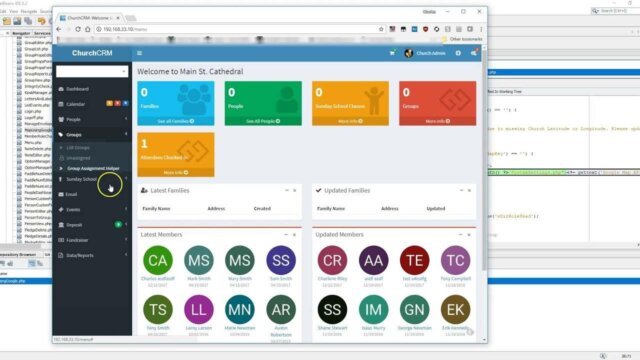
Important attributes:
- Group and family management
- Pledges, tithes, and event monitoring
- Communication and scheduling of volunteers
Pros:
- Community-driven and free
- Adapted to church operations
- Self-hosting is easy.
Cons:
- Unsuitable for charities that are not churches
- Absence of integrated AI tools
Cost: Free for self-hosted
Source: Visit https://churchcrm.io/ to learn more.
Raklet
Is Ideal For: International NGOs and membership-based charities
Overview:
Raklet is a cutting-edge CRM that has tools for handling mobile apps, newsletters, memberships, and donations. It’s perfect for nonprofits with international operations or donor programs that use subscriptions.
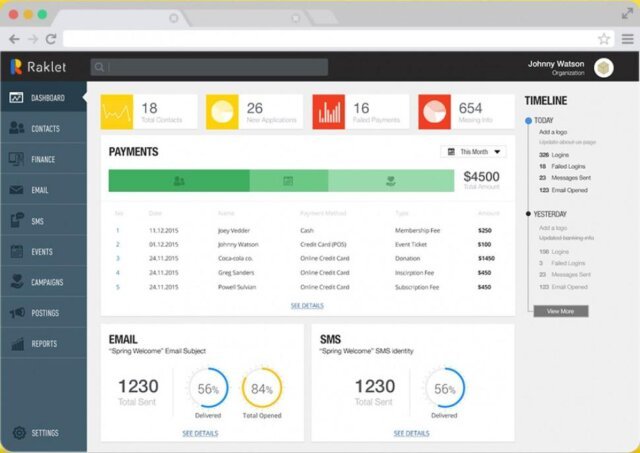
Important attributes:
- Levels of membership and ongoing contributions
- Mobile apps with a brand
- Marketing with SMS and email
- Highlights of AI and Automation:
- Astute segmentation and labeling
- Automated scheduled emails and SMS
Pros:
- Provides contributors and members with a mobile app.
- Excellent for global nonprofits
- Good automation and a stylish UI
Cons:
- Features for reporting are more fundamental.
- Limited personalization for big organizations
Pricing: Free at first, with advanced features costing $49 per month.
Source: Visit https://www.raklet.com/nonprofits/
Tips for CRM Selection: Choose the Best CRM Option for Your Charity
To assist you confidently reduce your options, here is a breakdown:
| Your Charity’s Need | Recommended CRM(s) | Why It Works |
| Scalability & Enterprise-Level AI | Salesforce Nonprofit Cloud | Ideal for large charities and NGOs managing complex donor relationships, grants, and programs across multiple regions. Einstein AI gives a powerful edge. |
| Donor Retention & Fundraising Optimization | Bloomerang, Virtuous CRM | Both CRMs specialize in improving donor lifetime value. With tools like engagement scoring and behaviour tracking, you can automate and personalize campaigns. |
| Cost-Effective for Small Teams | Keela, Little Green Light, Kindful | These platforms are affordable, user-friendly, and built with small-to-medium teams in mind. Keela offers AI tools even at budget tiers. |
| All-in-One Marketing & CRM Stack | HubSpot for Nonprofits | Combines email marketing, contact management, campaign analytics, and automation — perfect for content-heavy organizations. |
| Event, Volunteer & Membership Management | Neon CRM, Raklet | Supports holistic operations like event registration, volunteer coordination, and tiered memberships. Raklet also includes a branded mobile app. |
| Faith-Based & Religious Charities | ChurchCRM | Designed for churches and ministries managing tithes, family records, and congregation communication — and it’s free to host. |
| Open-Source, Fully Customizable CRM | CiviCRM | For tech-savvy nonprofits with in-house developers, CiviCRM offers full control and integration into Drupal, Joomla, or WordPress. |
| Advocacy and Political Campaigns | EveryAction (now Bonterra) | Purpose-built for nonprofits engaged in activism, email list building, and grassroots mobilization. |
| Online Fundraising + Crowdfunding Campaigns | Fundly CRM | Best for organizations that run peer-to-peer giving campaigns and need strong social sharing and donation forms. |
| Visual + Workflow-Driven Teams | Monday.com CRM Template | A great fit for project-focused charities that want a visual, drag-and-drop interface with flexible workflows. |
Case Studies:
Case Study 1: “Feeding Westchester” Boosts Donor Retention with DonorPerfect
The first case study is “Feeding Westchester,” a regional food bank in New York that distributes more than 20 million pounds of food a year. It uses DonorPerfect to increase donor retention.
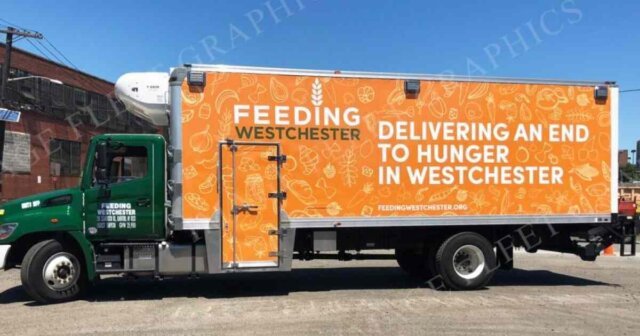
Challenge:
Despite its rapid growth, the organization found it difficult to monitor donor contacts and neglected to appropriately categorize donor messages. Donor weariness and a decline in regular gifts resulted from this.
Solution:
In order to optimize its donor database and send out tailored email campaigns to reflect donation patterns, Feeding Westchester deployed DonorPerfect.
Key Findings:
- In the first year, donor retention rose by 24%.
- Segmented donor journeys were created, with one-time contributors receiving distinct messaging from regular donors.
- Created a successful peer-to-peer campaign with 40% more conversions than prior ones and included mobile donating.
Quotation: “We were able to transition from static lists to dynamic donor engagement thanks to DonorPerfect.” Their support and analytics were revolutionary. — Development Officer Karly H.
Source: DonorPerfect Case Studies
(https://www.donorperfect.com/fundraising-software/customers/)
Case Study 2: “Free Software Foundation Europe (FSFE)”
It uses CiviCRM to Simplify Operations
Organization: FSFE is a nonprofit organization that unites volunteers from more than 30 countries and works to advance software freedom and digital rights throughout Europe. It speaks more than ten languages.

Problem: The group lacked a centralized structure for members or donors. Spreadsheets, email lists, and handwritten forms were being used by teams, which made it challenging to grow, adhere to GDPR, and monitor foreign support.
Solution: CiviCRM was implemented by FSFE as a self-hosted solution that was completely integrated with their Drupal CMS. They created automatic membership renewals, volunteer coordination modules, and bilingual donation forms.
Key Findings:
- Managing donations and delivering tax receipts takes 80% less time.
- Data processes that were completely compliant with GDPR were put into place.
- Coordinated communication with volunteers throughout the world using a single platform.
Quotation: “Without vendor lock-in, CiviCRM allowed us complete control over our data.” It’s the best buddy of a tech-savvy NGO. Erik A., FSFE’s IT Lead
Source: CiviCRM Case Studies
(https://civicrm.org/case-studies/free-software-foundation-europe)
FAQ Section
Which CRM is ideal for nonprofit organizations?
The size, goals, and budget of your organization will determine which CRM is ideal for charity. Among the best-performing CRMs in 2025 are:
- Salesforce Nonprofit Cloud is the best option for big nonprofits looking for scalability and automation driven by AI.
- Bloomerang: Perfect for mid-sized businesses who want to keep their donors.
- Virtuous: Excellent for automated fundraising that responds quickly.
- Excellent for marketing-focused NGOs with robust email and content capabilities is HubSpot for Nonprofits.
- Kindful is ideal for small NGOs that require robust donation monitoring and ease of use.
For instance,
Nusaker choose Salesforce in order to improve donor retention, automate processes, and obtain AI insights. Their achievement demonstrates the value of matching strategic impact objectives with CRM selection.
Do NGOs have access to a free CRM?
Indeed, a number of CRMs provide organizations with free or heavily subsidized plans:
- Salesforce.org’s Power of Us Program grants charitable organizations ten complimentary licenses.
- HubSpot CRM offers substantial charitable savings for premium services in addition to a free tier with basic functionality.
- Bitrix24 offers a free plan with contact and donation monitoring tools that is appropriate for small NGOs.
- Zoho CRM for Nonprofits: Provides affordable and free solutions with personalized processes.
Remember that although free CRMs are excellent for new businesses and small teams, basic functionalities are frequently outgrown by expanding nonprofits. Long-term cost savings can be achieved by investing in a scalable platform.
What is a CRM for a charity?
A charity’s CRM (Customer Relationship Management) system is an online platform made to oversee and cultivate connections with:
- Contributors
- Volunteers
- Partners
- Recipients
Nonprofit CRMs, as opposed to conventional commercial CRMs, concentrate on engagement management, impact reporting, gift monitoring, and fundraising campaigns. AI techniques are now widely used to enhance fundraising, forecast giving behaviour, and automate donor contacts.
To identify significant contribution prospects, Nusaker used predictive analytics, AI-powered donor segmentation, and automatic thank-you emails made possible by their CRM.
How do I pick a CRM for fundraising?
There are many phases involved in selecting the best fundraising CRM:
- Specify your objectives: Do you wish to organize events, automate communications, or increase donor retention?
- Examine your available data: Be aware of the systems you are integrating or replacing.
- Identify the essential features: Keep an eye out for AI capabilities, campaign analytics, email automation, volunteer management, and donation monitoring.
- Decide on a budget: Take into account the entire cost, which includes setup, instruction, and continuing support.
- Assess the platform’s scalability to make sure it can expand with your company.
- Request free trials and demos: Check for integration and usability with your existing tools.
See a practical example of matching CRM capabilities with nonprofit impact objectives by reading about Nusaker’s CRM journey in this blog.
How might AI help organizations increase donor engagement?
AI assists NGOs in strengthening their ties with donors by:
- Adapting outreach to the interests and actions of donors
- Forecasting donor attrition and facilitating fast re-engagement
- Automating processes, including reminding people or sending thank-you notes
- Separating contributors for focused campaigns (e.g., first-time vs. substantial contributions)
According to this blog, Nusaker increased donor retention by 24% by using Salesforce Einstein to find lapsed contributors and start AI-driven email sequences.
In 2025, what characteristics should a nonprofit seek in a CRM?
A charity CRM should focus the following important features:
- Database of donors with complete history
- Tracking pledges and donations
- Automation of SMS and email
- Management of events and volunteers
- Impact and reporting of grants
- AI-driven donor predicting and insights
- Connectivity with systems for fundraising, accounting, and marketing
AI elements that were previously exclusive to business platforms like Salesforce are now included into CRMs like Virtuous and Bloomerang.
Can AI-powered CRMs be advantageous for tiny nonprofits?
Indeed. AI may be used by small NGOs in lightweight CRMs to:
- Make repetitious chores (like thank-you emails and receipts) automated.
- Find the contributors who are most likely to make additional contributions.
- Spend less time segmenting and reporting.
- Increase the resources allocated to mission delivery.
HubSpot, Kindful, and Bloomerang are just a few of the products that provide AI-powered capabilities that are affordable and easy to use for smaller businesses.
Conclusion: The Future of Charity Is Being Shaped by Nusaker and Today’s Leading Platforms: Smart CRM, Smarter Impact
More than just a success story, Nusaker’s journey from a modest community project to a data-driven, AI-powered charity serves as a model for what can be achieved when cutting-edge technology and worthwhile causes are combined. Through the smart use of the appropriate CRM, their path demonstrates that even the most grassroots organizations can scale operations, create enduring donor connections, and increase their worldwide influence.
The CRM environment in 2025 offers strong, adaptable tools to support your growth, whether you’re a huge organization spearheading worldwide development, a church overseeing tithes and volunteers, or a tiny charity just getting started. Every type of cause has a dedicated solution, ranging from powerful platforms like Salesforce Nonprofit Cloud and Bloomerang to more affordable champions like Keela and Little Green Light, as well as open-source substitutes like CiviCRM or ChurchCRM.
CRMs are much more than just databases these days. They streamline fundraising efforts, automate donor experiences, provide predictive insights, and give your staff the ability to make decisions based on data. The ideal CRM is your charity’s digital partner in mission, not merely a tech tool.
As Nusaker keeps using technology and transparency to empower marginalized communities, their tale serves as a reminder that while the core of charity never changes, the instruments we employ can and should. A smarter, stronger, and more sustainable future for all is the outcome of combining AI with empathy and strategy with service.



